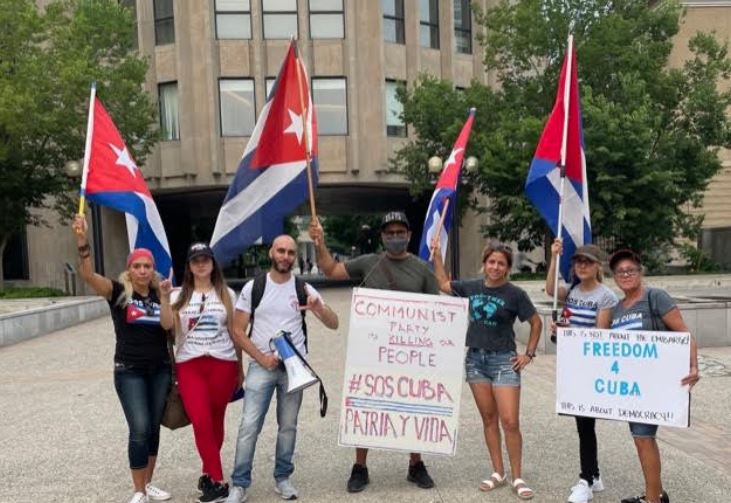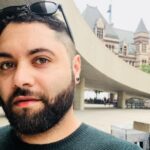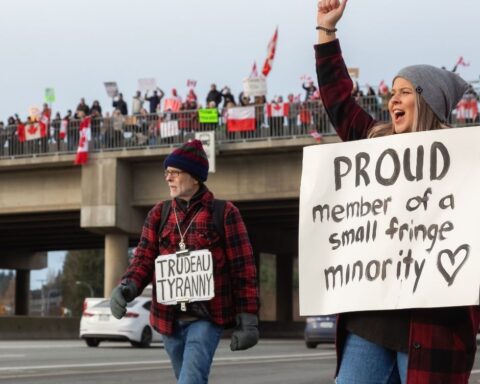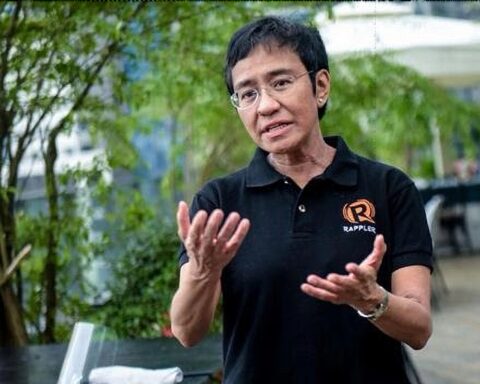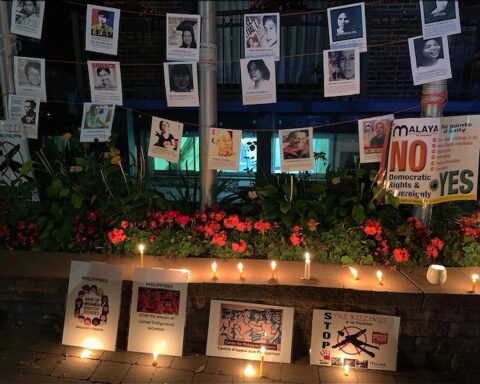Standing between the United States Consulate and the Law Society of Ontario in downtown Toronto, Jorge Heredia is draped in a Cuban flag. He’s holding a pro-democracy message inscribed on a white bristol board, reading: “Whenever Cubans rise up on the streets of Havana demanding their freedom, we will replicate their cries here as Cuban-Canadians.”
Anti-government dissent on the streets of Cuba is rare, yet recent protests against the communist regime reveal profound dissatisfaction among Cubans. The people’s dissatisfaction is fuelled by growing political and economic pressures exacerbated by the COVID-19 pandemic which has cut off tourism – the island’s primary source of revenue. Rising inflation rates caused by trade embargoes, an unstable currency has led to deteriorating living conditions. The country is roiled by power outages and shortages of food and medicine.
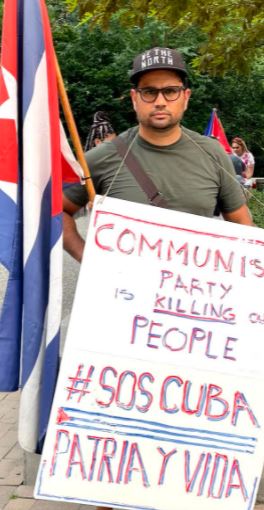
Meanwhile, COVID-19 cases have climbed to more than 9,000 per day in early August. Following the historic protests, the government of Miguel Diaz-Canel imposed a media blackout and shut down the Internet. Just last week, a new cybersecurity law was passed that would prevent citizens from using social media to criticize the government.
Heredia came to Canada in 1998 as one of many refugee claimants and political exiles from Cuba. As the situation in his homeland worsens, Heredia denounces what he views as Canada’s contradictory policy toward Cuba.
Prime Minister Justin Trudeau has acknowledged that the massive protests in June were not just about anger over food shortages but a political demand for democracy. Despite condemning the crackdown on demonstrators, Heredia said he feels Trudeau’s forceful rhetoric hasn’t been accompanied by action.
“The Canadian government needs to stand up and sanction Cuba like it would any other government disenfranchising its people.” Heredia insisted. “The crisis negatively impacting Cuban citizens is directly enabled by our Canadian governments remaining neutral on certain positions.”
Sending Fellow Canadians A Message
Heredia is attending demonstrations to send fellow Canadians a message, “If you visit Cuba and you enjoy vacationing in Cuba, reach out to your Canadian-Cuban neighbours. Learn how to support our settler community here and the future of Cuba’s people.”
Like many people who seek refuge in Canada, Heredia came here for the financial opportunities it presented. He wanted to be able to provide financially for his extended family in Cuba but he says it’s become more difficult to send money back home. Blaming U.S. sanctions, the Cuban government has decided to temporarily stop accepting American currency (USD). Many worry that this decision could become permanent.
As of June, Cuban citizens can only find essential products including milk, eggs, rice and hygiene supplies at state-sanctioned merchants who only accept Monedas de Libre Comercio (MLC). All foreign currency must now be converted to MLC meaning it’s the only viable currency option for Cubans living on the island.
“Before I could just send any currency and my family would withdraw cash from an ATM. Now Cubans are limited to State-funded merchants who only accept the state’s new MLC currency,” Heredia said.
Reprisals for Exiles
Miriam Bressler is a civil servant who has lived in Canada for 24 years. Her husband, Emilio Bressler Cisneros, is a former political prisoner who was charged with “distributing enemy propaganda” for allegedly spreading flyers that were critical of the government. He was sentenced to six years imprisonment at the notorious Prisión de Boniato, in Santiago de Cuba province.
Bressler told New Canadian Media that Cubans living abroad face reprisals if they attempt to enter Cuba, particularly if they’ve been critical of the communist government. She says her husband is among the many Canadian-Cubans routinely denied entry into the Caribbean nation. Cisnero hasn’t seen his family since defecting from the island in 1998.
Bressler claims the Cuban government won’t even allow her husband into the Cuban consulate in Canada to apply for a Cuban passport to re-enter the country.
“This is not right. We need our Canadian government to advocate for Cuban-Canadian rights,” Bressler said.
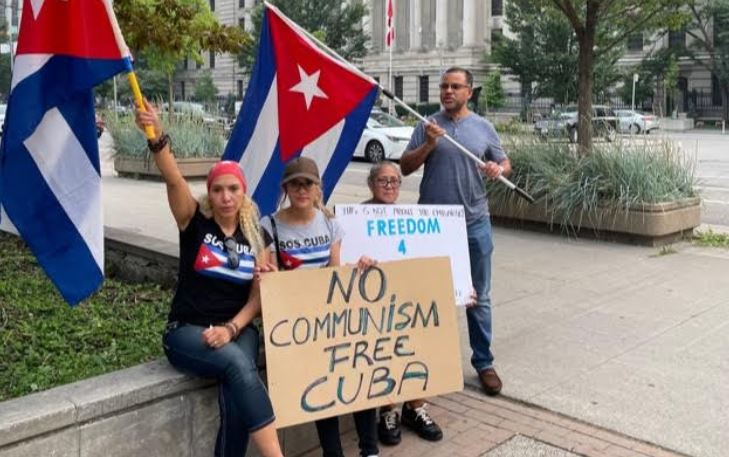
Bressler’s Canadian-born daughter, Yessica, is equally concerned about Cuba’s future. While attending the demonstration in Toronto, she spoke about the Canadian Communist Party activists and Socialist Action supporters who gathered across from her.
The Communist Party of Canada and Socialist Action activists are perceived as insulting to some Cuban-Canadians. Yessica suspects there aren’t many members of these groups who belong to the Cuban diaspora, and if not, she said they’re doing her community a great disservice.
She says that under Cuba’s dictatorship, citizens aren’t able to exercise rights like freedom of speech or freedom of assembly which members of these groups can freely exercise in Canada. Yessica said that they have an obvious blind spot.
“What they (Communist Party of Canada & Socialist Action activists) don’t understand is that by supporting the regime in Cuba, they’re not supporting the Cuban people who’ve thrown themselves into the streets peacefully,” she said.
Impacting votes at the ballot-box
“Cubans are asking for freedom. The activists romanticizing the Cuban Revolution and Cuban-style‘ communism’ and ‘socialism’ are not hearing the Cuban people’s demands. Cubans need food, medicine, employment and an open economy. All things that are much more widely accessible to all Canadians, independent of political views or dissenting opinions,” Yessica explained.
Like Heredia, both Miriam and Yessica joined pro-democracy supporters in Toronto to show solidarity with the citizens taking to the streets in Cuba.
“The reason we are gathering here today is because Cubans don’t have a voice there. There are independent media…but journalists are being attacked. If they dissent, they are arbitrarily detained and thrown in jail,” Miriam said. “We need the Canadian audience to know what is actually happening. A lot of people have been under the illusion that Cubans live in a social utopia,” she continued.
Those who support Cuba’s pro-democracy movement want Prime Minister Justin Trudeau to speak on behalf of the “overwhelming majority” of Cuban-Canadian constituents who settled here as refugees. They hope to eventually see Cubans freed from economic and social stagnation. Some also urge the prime minister to refer to the island nation’s government as a “dictatorship” and “regime” to send a strong message to other countries.
For many at the solidarity rally, how politicians respond will impact how they vote at the ballot box.
“We urge our leaders in Canada and the Trudeau government to stand up on our behalf, influencing sustainable change for a new relationship forward together with the Cuban people,” said one protestor, as the crowd dispersed with a promise to continue their campaign for freedom for Cuba’s people.
This story has been produced under NCM’s mentoring program. Mentor: Marcus Medford

